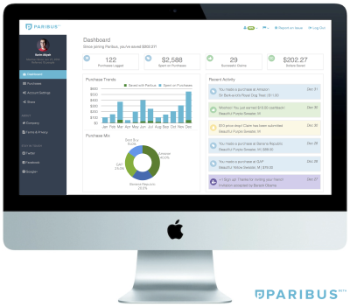SEAS alumnus develops a web application that finds rebates for online shoppers
With the holiday retail frenzy entering high gear, many online shoppers are feeling pretty smug about scoring great deals on the perfect presents. But that smugness quickly dissolves into frustration when a shopper realizes the item they purchased only a few days ago is now on sale for a lower price.
Karim Atiyeh, A.B. /S.M. ’11 knows that frustrated feeling firsthand.
“I like to think of myself as a smart shopper, but I kept seeing these price fluctuations in the products I was purchasing and I couldn’t shake the feeling that I was getting scammed,” he said.
 Atiyeh, who earned an A.B. in electrical engineering and an S.M. in computer science through the joint degree program at the Harvard John A. Paulson School of Engineering and Applied Sciences, decided to use technology to take the guesswork out of online bargain hunting. He and co-founder Eric Glyman, A.B. ’12, an economics and East Asian studies concentrator, developed Paribus, a web application that tracks the prices of purchased items and automatically applies for retailer rebates when prices are reduced. Their company launched out of the startup accelerator Y Combinator in July.
Atiyeh, who earned an A.B. in electrical engineering and an S.M. in computer science through the joint degree program at the Harvard John A. Paulson School of Engineering and Applied Sciences, decided to use technology to take the guesswork out of online bargain hunting. He and co-founder Eric Glyman, A.B. ’12, an economics and East Asian studies concentrator, developed Paribus, a web application that tracks the prices of purchased items and automatically applies for retailer rebates when prices are reduced. Their company launched out of the startup accelerator Y Combinator in July.
The premise is simple: most retailers have policies that provide rebates for customers if an item’s price drops within a certain number of days after purchase. Some stores go even further and provide rebates if a competing retailer offers the same product at a lower price. The rub, Atiyeh explains, is that customers have to do the legwork themselves.
Many consumers are unaware such programs exist. Even if they did know about the rebates, few would likely sacrifice their free time to scour Internet retail sites, tracking price fluctuations and filling out tedious online rebate forms. To make such an onerous task even more irritating, each store has a different policy, and information about rebates is often buried under layers of fine print.
Paribus helps ensure online shoppers receive the rebates they are owed. To get started, a user simply links the application to an email inbox. Paribus identifies purchase prices in email receipts and loads the information into a database. The application then continues to cross check the database with price fluctuations and relevant store policies. When a purchase is eligible for a rebate, the refund request is automatically submitted on the user’s behalf. The company takes a 25-percent commission and then sends the balance to the user.
It sounds great f or an e-commerce junkie, but won’t retail outlets balk at this new automated system?
or an e-commerce junkie, but won’t retail outlets balk at this new automated system?
“This is not a bad thing for retailers,” Atiyeh said. “After shoppers start using Paribus, they tend to spend more money shopping online. Because they are more confident when making purchases, they are also less likely to abandon their shopping carts.”
The application currently tracks items offered by 18 retailers, including Best Buy, Bloomingdale’s, Macy’s, and Sephora. In the short term, Atiyeh and his co-founders are looking to incorporate new stores into the Paribus database. Their long-term goal is to branch out into other marketplaces, such as hotel rooms, flights, and credit card claims.
Right now, the team is busy gearing up for a hectic holiday shopping season. Paribus has seen its user base balloon from 1,000 in June to more than 50,000 users today, and Atiyeh expects that number to increase exponentially during the busiest shopping weeks of the year. Once the dust settles, the Paribus team will set their sights on building an infrastructure that is scalable and flexible, so the company can continue to grow, said Atiyeh.
“It has been amazing to see a community come together and get excited about Paribus,” he said. “It has been very rewarding, too. I’m an engineer at heart, so for me, the most exciting part of this has been solving challenges that no one has solved before.”